Report on People Management in NHS: Leadership, Training, and Talent
VerifiedAdded on 2023/01/11
|8
|2438
|47
Report
AI Summary
This report provides an overview of people management within the National Health Service (NHS), focusing on leadership, training, and talent management. It explores how leadership and management principles are applied to build strong teams and adapt to the dynamic demands of the healthcare industry. The report highlights the importance of training and development programs in enhancing employee skills and ensuring high-quality service delivery. Furthermore, it examines the role of talent management in identifying, developing, and retaining skilled employees to foster innovation and maintain a high standard of care. The NHS's commitment to continuous improvement and employee development is emphasized as a key factor in its success as a leading healthcare provider. The report discusses how the NHS adapts to new changes, incorporates innovative medical treatments, and maintains a collaborative working culture, making it a model for effective people management within the healthcare sector. The report concludes with the analysis of how employees and stakeholders contribute to the synergy of NHS and the advancements in the healthcare industry.

Introduction to people
management
management
Paraphrase This Document
Need a fresh take? Get an instant paraphrase of this document with our AI Paraphraser
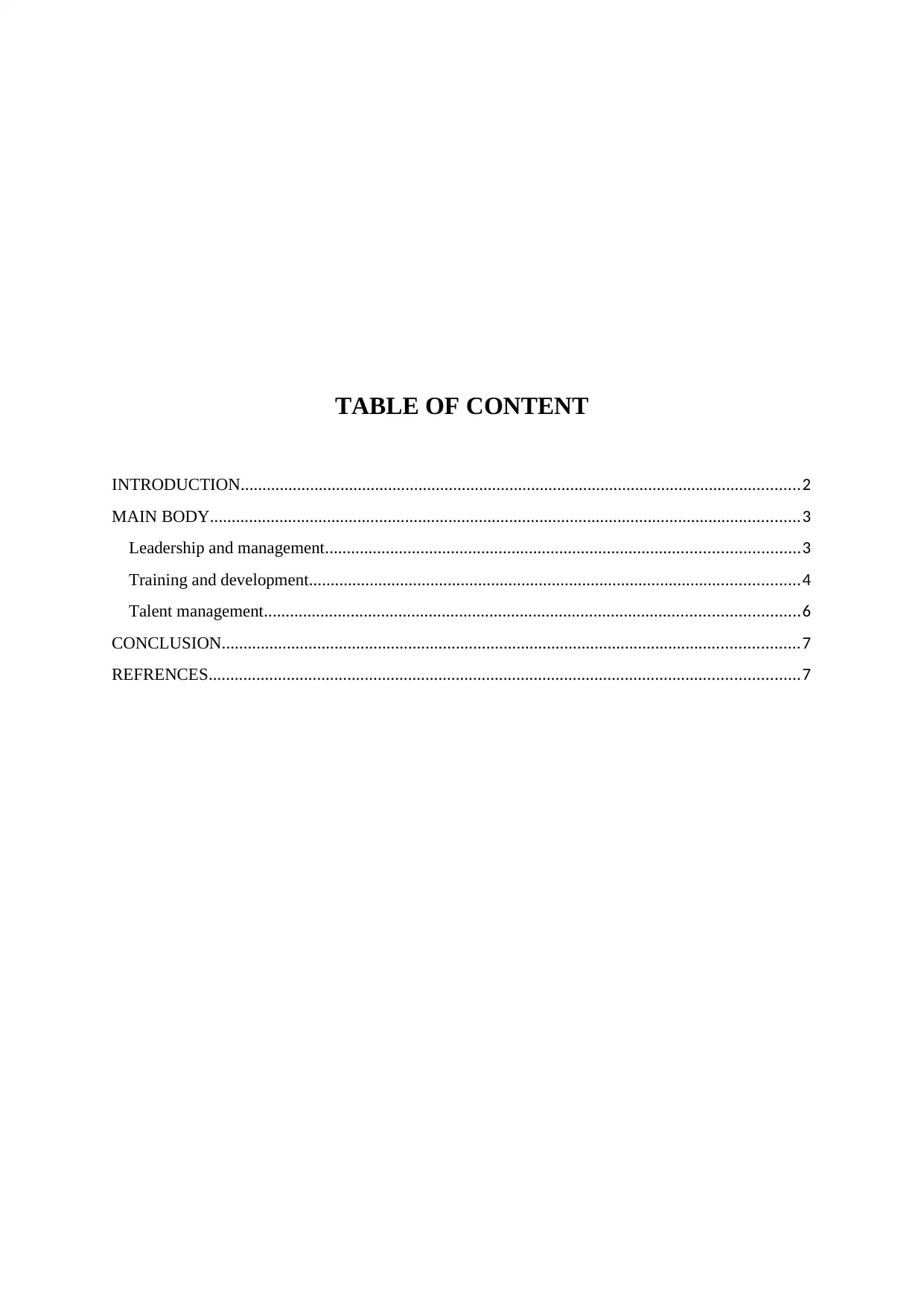
TABLE OF CONTENT
INTRODUCTION.................................................................................................................................2
MAIN BODY........................................................................................................................................3
Leadership and management.............................................................................................................3
Training and development.................................................................................................................4
Talent management...........................................................................................................................6
CONCLUSION.....................................................................................................................................7
REFRENCES........................................................................................................................................7
INTRODUCTION.................................................................................................................................2
MAIN BODY........................................................................................................................................3
Leadership and management.............................................................................................................3
Training and development.................................................................................................................4
Talent management...........................................................................................................................6
CONCLUSION.....................................................................................................................................7
REFRENCES........................................................................................................................................7
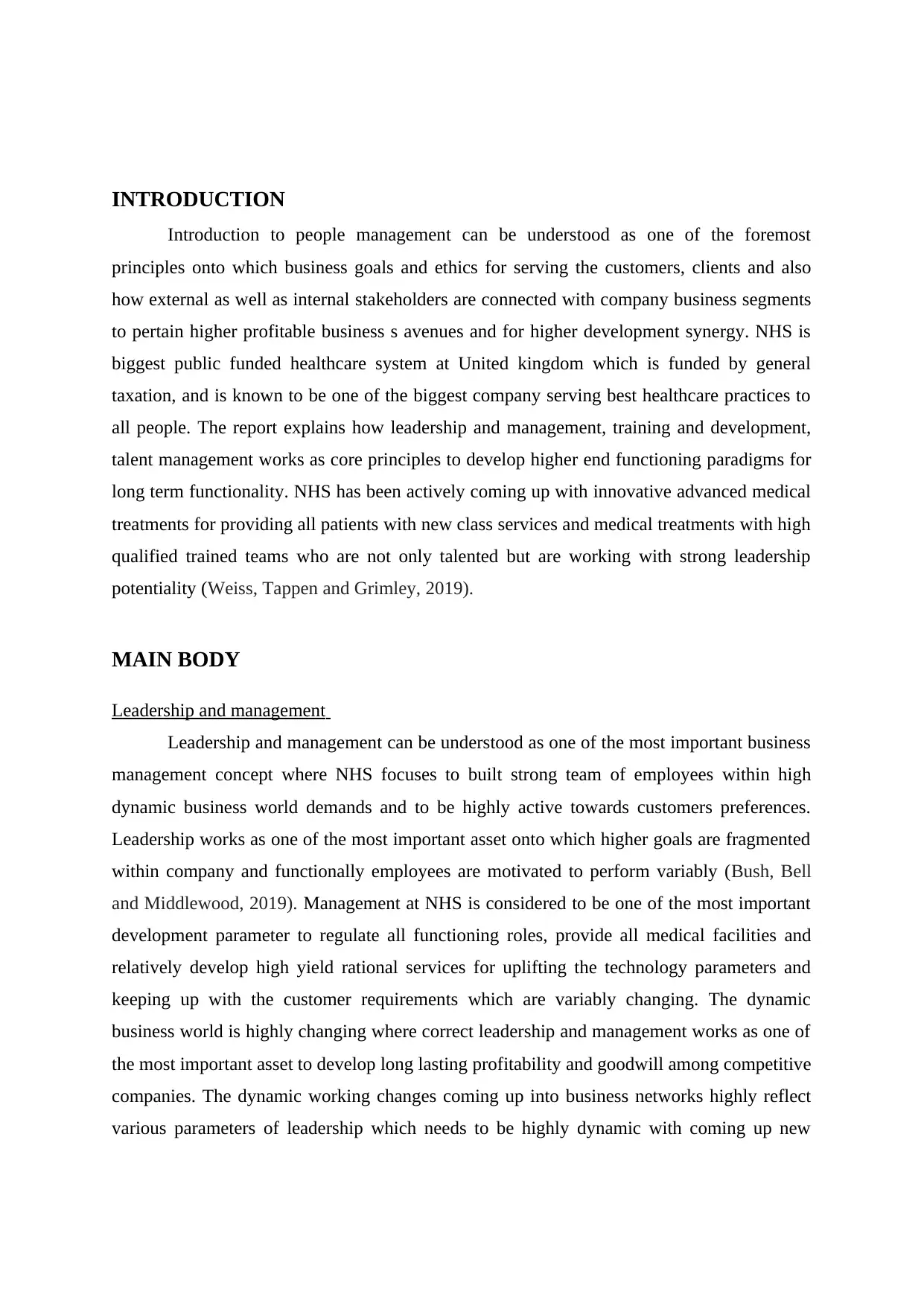
INTRODUCTION
Introduction to people management can be understood as one of the foremost
principles onto which business goals and ethics for serving the customers, clients and also
how external as well as internal stakeholders are connected with company business segments
to pertain higher profitable business s avenues and for higher development synergy. NHS is
biggest public funded healthcare system at United kingdom which is funded by general
taxation, and is known to be one of the biggest company serving best healthcare practices to
all people. The report explains how leadership and management, training and development,
talent management works as core principles to develop higher end functioning paradigms for
long term functionality. NHS has been actively coming up with innovative advanced medical
treatments for providing all patients with new class services and medical treatments with high
qualified trained teams who are not only talented but are working with strong leadership
potentiality (Weiss, Tappen and Grimley, 2019).
MAIN BODY
Leadership and management
Leadership and management can be understood as one of the most important business
management concept where NHS focuses to built strong team of employees within high
dynamic business world demands and to be highly active towards customers preferences.
Leadership works as one of the most important asset onto which higher goals are fragmented
within company and functionally employees are motivated to perform variably (Bush, Bell
and Middlewood, 2019). Management at NHS is considered to be one of the most important
development parameter to regulate all functioning roles, provide all medical facilities and
relatively develop high yield rational services for uplifting the technology parameters and
keeping up with the customer requirements which are variably changing. The dynamic
business world is highly changing where correct leadership and management works as one of
the most important asset to develop long lasting profitability and goodwill among competitive
companies. The dynamic working changes coming up into business networks highly reflect
various parameters of leadership which needs to be highly dynamic with coming up new
Introduction to people management can be understood as one of the foremost
principles onto which business goals and ethics for serving the customers, clients and also
how external as well as internal stakeholders are connected with company business segments
to pertain higher profitable business s avenues and for higher development synergy. NHS is
biggest public funded healthcare system at United kingdom which is funded by general
taxation, and is known to be one of the biggest company serving best healthcare practices to
all people. The report explains how leadership and management, training and development,
talent management works as core principles to develop higher end functioning paradigms for
long term functionality. NHS has been actively coming up with innovative advanced medical
treatments for providing all patients with new class services and medical treatments with high
qualified trained teams who are not only talented but are working with strong leadership
potentiality (Weiss, Tappen and Grimley, 2019).
MAIN BODY
Leadership and management
Leadership and management can be understood as one of the most important business
management concept where NHS focuses to built strong team of employees within high
dynamic business world demands and to be highly active towards customers preferences.
Leadership works as one of the most important asset onto which higher goals are fragmented
within company and functionally employees are motivated to perform variably (Bush, Bell
and Middlewood, 2019). Management at NHS is considered to be one of the most important
development parameter to regulate all functioning roles, provide all medical facilities and
relatively develop high yield rational services for uplifting the technology parameters and
keeping up with the customer requirements which are variably changing. The dynamic
business world is highly changing where correct leadership and management works as one of
the most important asset to develop long lasting profitability and goodwill among competitive
companies. The dynamic working changes coming up into business networks highly reflect
various parameters of leadership which needs to be highly dynamic with coming up new
⊘ This is a preview!⊘
Do you want full access?
Subscribe today to unlock all pages.

Trusted by 1+ million students worldwide
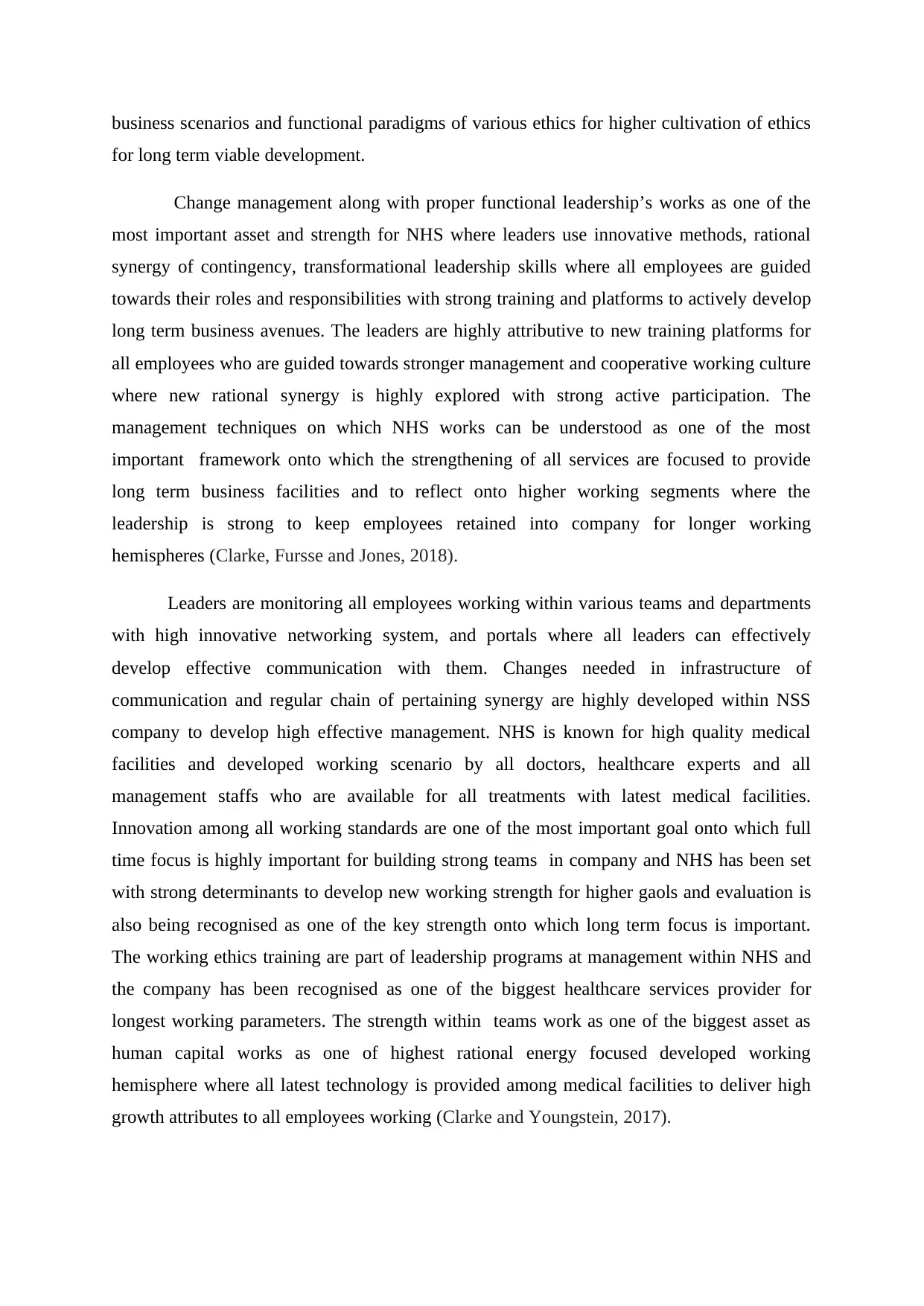
business scenarios and functional paradigms of various ethics for higher cultivation of ethics
for long term viable development.
Change management along with proper functional leadership’s works as one of the
most important asset and strength for NHS where leaders use innovative methods, rational
synergy of contingency, transformational leadership skills where all employees are guided
towards their roles and responsibilities with strong training and platforms to actively develop
long term business avenues. The leaders are highly attributive to new training platforms for
all employees who are guided towards stronger management and cooperative working culture
where new rational synergy is highly explored with strong active participation. The
management techniques on which NHS works can be understood as one of the most
important framework onto which the strengthening of all services are focused to provide
long term business facilities and to reflect onto higher working segments where the
leadership is strong to keep employees retained into company for longer working
hemispheres (Clarke, Fursse and Jones, 2018).
Leaders are monitoring all employees working within various teams and departments
with high innovative networking system, and portals where all leaders can effectively
develop effective communication with them. Changes needed in infrastructure of
communication and regular chain of pertaining synergy are highly developed within NSS
company to develop high effective management. NHS is known for high quality medical
facilities and developed working scenario by all doctors, healthcare experts and all
management staffs who are available for all treatments with latest medical facilities.
Innovation among all working standards are one of the most important goal onto which full
time focus is highly important for building strong teams in company and NHS has been set
with strong determinants to develop new working strength for higher gaols and evaluation is
also being recognised as one of the key strength onto which long term focus is important.
The working ethics training are part of leadership programs at management within NHS and
the company has been recognised as one of the biggest healthcare services provider for
longest working parameters. The strength within teams work as one of the biggest asset as
human capital works as one of highest rational energy focused developed working
hemisphere where all latest technology is provided among medical facilities to deliver high
growth attributes to all employees working (Clarke and Youngstein, 2017).
for long term viable development.
Change management along with proper functional leadership’s works as one of the
most important asset and strength for NHS where leaders use innovative methods, rational
synergy of contingency, transformational leadership skills where all employees are guided
towards their roles and responsibilities with strong training and platforms to actively develop
long term business avenues. The leaders are highly attributive to new training platforms for
all employees who are guided towards stronger management and cooperative working culture
where new rational synergy is highly explored with strong active participation. The
management techniques on which NHS works can be understood as one of the most
important framework onto which the strengthening of all services are focused to provide
long term business facilities and to reflect onto higher working segments where the
leadership is strong to keep employees retained into company for longer working
hemispheres (Clarke, Fursse and Jones, 2018).
Leaders are monitoring all employees working within various teams and departments
with high innovative networking system, and portals where all leaders can effectively
develop effective communication with them. Changes needed in infrastructure of
communication and regular chain of pertaining synergy are highly developed within NSS
company to develop high effective management. NHS is known for high quality medical
facilities and developed working scenario by all doctors, healthcare experts and all
management staffs who are available for all treatments with latest medical facilities.
Innovation among all working standards are one of the most important goal onto which full
time focus is highly important for building strong teams in company and NHS has been set
with strong determinants to develop new working strength for higher gaols and evaluation is
also being recognised as one of the key strength onto which long term focus is important.
The working ethics training are part of leadership programs at management within NHS and
the company has been recognised as one of the biggest healthcare services provider for
longest working parameters. The strength within teams work as one of the biggest asset as
human capital works as one of highest rational energy focused developed working
hemisphere where all latest technology is provided among medical facilities to deliver high
growth attributes to all employees working (Clarke and Youngstein, 2017).
Paraphrase This Document
Need a fresh take? Get an instant paraphrase of this document with our AI Paraphraser
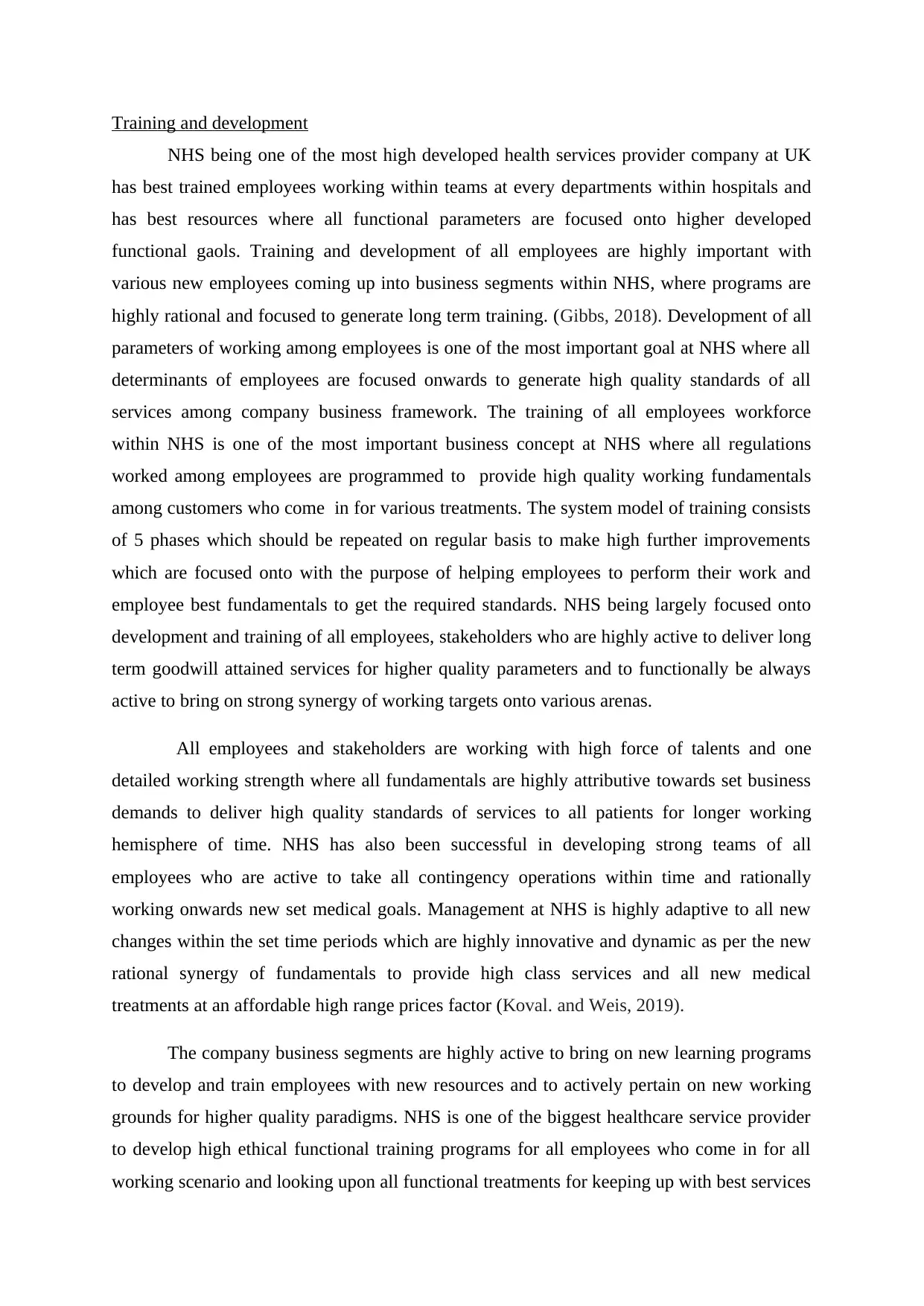
Training and development
NHS being one of the most high developed health services provider company at UK
has best trained employees working within teams at every departments within hospitals and
has best resources where all functional parameters are focused onto higher developed
functional gaols. Training and development of all employees are highly important with
various new employees coming up into business segments within NHS, where programs are
highly rational and focused to generate long term training. (Gibbs, 2018). Development of all
parameters of working among employees is one of the most important goal at NHS where all
determinants of employees are focused onwards to generate high quality standards of all
services among company business framework. The training of all employees workforce
within NHS is one of the most important business concept at NHS where all regulations
worked among employees are programmed to provide high quality working fundamentals
among customers who come in for various treatments. The system model of training consists
of 5 phases which should be repeated on regular basis to make high further improvements
which are focused onto with the purpose of helping employees to perform their work and
employee best fundamentals to get the required standards. NHS being largely focused onto
development and training of all employees, stakeholders who are highly active to deliver long
term goodwill attained services for higher quality parameters and to functionally be always
active to bring on strong synergy of working targets onto various arenas.
All employees and stakeholders are working with high force of talents and one
detailed working strength where all fundamentals are highly attributive towards set business
demands to deliver high quality standards of services to all patients for longer working
hemisphere of time. NHS has also been successful in developing strong teams of all
employees who are active to take all contingency operations within time and rationally
working onwards new set medical goals. Management at NHS is highly adaptive to all new
changes within the set time periods which are highly innovative and dynamic as per the new
rational synergy of fundamentals to provide high class services and all new medical
treatments at an affordable high range prices factor (Koval. and Weis, 2019).
The company business segments are highly active to bring on new learning programs
to develop and train employees with new resources and to actively pertain on new working
grounds for higher quality paradigms. NHS is one of the biggest healthcare service provider
to develop high ethical functional training programs for all employees who come in for all
working scenario and looking upon all functional treatments for keeping up with best services
NHS being one of the most high developed health services provider company at UK
has best trained employees working within teams at every departments within hospitals and
has best resources where all functional parameters are focused onto higher developed
functional gaols. Training and development of all employees are highly important with
various new employees coming up into business segments within NHS, where programs are
highly rational and focused to generate long term training. (Gibbs, 2018). Development of all
parameters of working among employees is one of the most important goal at NHS where all
determinants of employees are focused onwards to generate high quality standards of all
services among company business framework. The training of all employees workforce
within NHS is one of the most important business concept at NHS where all regulations
worked among employees are programmed to provide high quality working fundamentals
among customers who come in for various treatments. The system model of training consists
of 5 phases which should be repeated on regular basis to make high further improvements
which are focused onto with the purpose of helping employees to perform their work and
employee best fundamentals to get the required standards. NHS being largely focused onto
development and training of all employees, stakeholders who are highly active to deliver long
term goodwill attained services for higher quality parameters and to functionally be always
active to bring on strong synergy of working targets onto various arenas.
All employees and stakeholders are working with high force of talents and one
detailed working strength where all fundamentals are highly attributive towards set business
demands to deliver high quality standards of services to all patients for longer working
hemisphere of time. NHS has also been successful in developing strong teams of all
employees who are active to take all contingency operations within time and rationally
working onwards new set medical goals. Management at NHS is highly adaptive to all new
changes within the set time periods which are highly innovative and dynamic as per the new
rational synergy of fundamentals to provide high class services and all new medical
treatments at an affordable high range prices factor (Koval. and Weis, 2019).
The company business segments are highly active to bring on new learning programs
to develop and train employees with new resources and to actively pertain on new working
grounds for higher quality paradigms. NHS is one of the biggest healthcare service provider
to develop high ethical functional training programs for all employees who come in for all
working scenario and looking upon all functional treatments for keeping up with best services
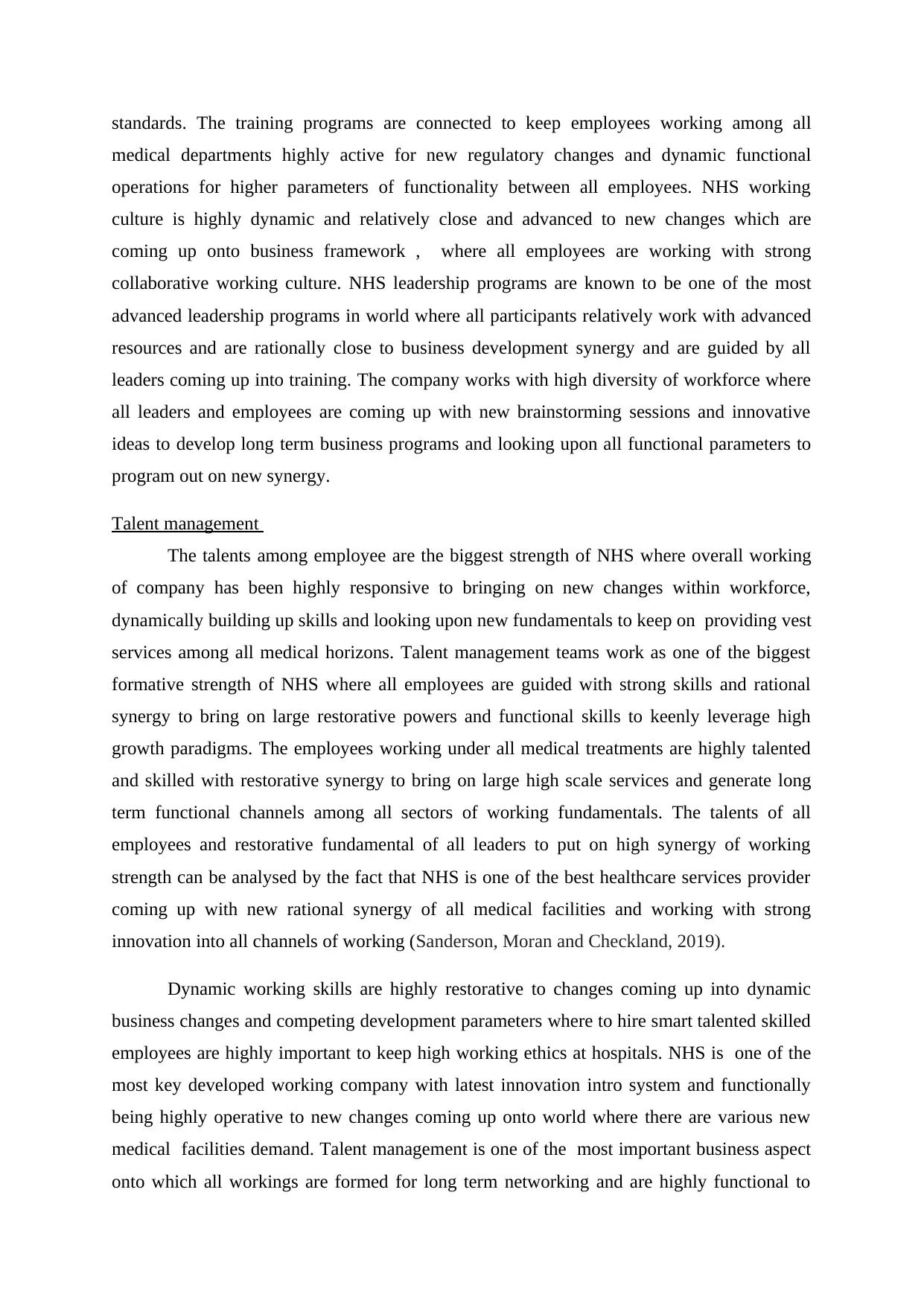
standards. The training programs are connected to keep employees working among all
medical departments highly active for new regulatory changes and dynamic functional
operations for higher parameters of functionality between all employees. NHS working
culture is highly dynamic and relatively close and advanced to new changes which are
coming up onto business framework , where all employees are working with strong
collaborative working culture. NHS leadership programs are known to be one of the most
advanced leadership programs in world where all participants relatively work with advanced
resources and are rationally close to business development synergy and are guided by all
leaders coming up into training. The company works with high diversity of workforce where
all leaders and employees are coming up with new brainstorming sessions and innovative
ideas to develop long term business programs and looking upon all functional parameters to
program out on new synergy.
Talent management
The talents among employee are the biggest strength of NHS where overall working
of company has been highly responsive to bringing on new changes within workforce,
dynamically building up skills and looking upon new fundamentals to keep on providing vest
services among all medical horizons. Talent management teams work as one of the biggest
formative strength of NHS where all employees are guided with strong skills and rational
synergy to bring on large restorative powers and functional skills to keenly leverage high
growth paradigms. The employees working under all medical treatments are highly talented
and skilled with restorative synergy to bring on large high scale services and generate long
term functional channels among all sectors of working fundamentals. The talents of all
employees and restorative fundamental of all leaders to put on high synergy of working
strength can be analysed by the fact that NHS is one of the best healthcare services provider
coming up with new rational synergy of all medical facilities and working with strong
innovation into all channels of working (Sanderson, Moran and Checkland, 2019).
Dynamic working skills are highly restorative to changes coming up into dynamic
business changes and competing development parameters where to hire smart talented skilled
employees are highly important to keep high working ethics at hospitals. NHS is one of the
most key developed working company with latest innovation intro system and functionally
being highly operative to new changes coming up onto world where there are various new
medical facilities demand. Talent management is one of the most important business aspect
onto which all workings are formed for long term networking and are highly functional to
medical departments highly active for new regulatory changes and dynamic functional
operations for higher parameters of functionality between all employees. NHS working
culture is highly dynamic and relatively close and advanced to new changes which are
coming up onto business framework , where all employees are working with strong
collaborative working culture. NHS leadership programs are known to be one of the most
advanced leadership programs in world where all participants relatively work with advanced
resources and are rationally close to business development synergy and are guided by all
leaders coming up into training. The company works with high diversity of workforce where
all leaders and employees are coming up with new brainstorming sessions and innovative
ideas to develop long term business programs and looking upon all functional parameters to
program out on new synergy.
Talent management
The talents among employee are the biggest strength of NHS where overall working
of company has been highly responsive to bringing on new changes within workforce,
dynamically building up skills and looking upon new fundamentals to keep on providing vest
services among all medical horizons. Talent management teams work as one of the biggest
formative strength of NHS where all employees are guided with strong skills and rational
synergy to bring on large restorative powers and functional skills to keenly leverage high
growth paradigms. The employees working under all medical treatments are highly talented
and skilled with restorative synergy to bring on large high scale services and generate long
term functional channels among all sectors of working fundamentals. The talents of all
employees and restorative fundamental of all leaders to put on high synergy of working
strength can be analysed by the fact that NHS is one of the best healthcare services provider
coming up with new rational synergy of all medical facilities and working with strong
innovation into all channels of working (Sanderson, Moran and Checkland, 2019).
Dynamic working skills are highly restorative to changes coming up into dynamic
business changes and competing development parameters where to hire smart talented skilled
employees are highly important to keep high working ethics at hospitals. NHS is one of the
most key developed working company with latest innovation intro system and functionally
being highly operative to new changes coming up onto world where there are various new
medical facilities demand. Talent management is one of the most important business aspect
onto which all workings are formed for long term networking and are highly functional to
⊘ This is a preview!⊘
Do you want full access?
Subscribe today to unlock all pages.

Trusted by 1+ million students worldwide
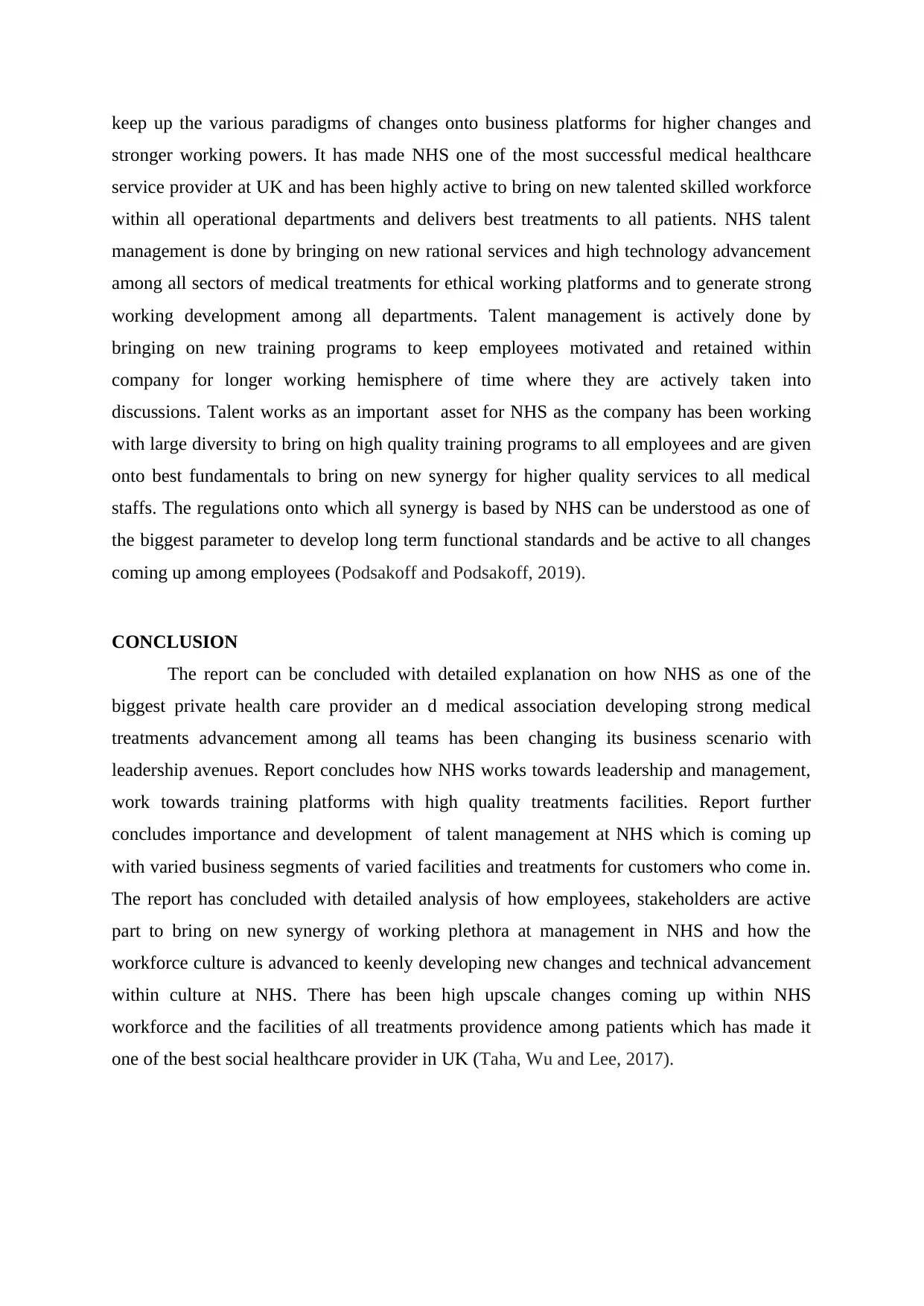
keep up the various paradigms of changes onto business platforms for higher changes and
stronger working powers. It has made NHS one of the most successful medical healthcare
service provider at UK and has been highly active to bring on new talented skilled workforce
within all operational departments and delivers best treatments to all patients. NHS talent
management is done by bringing on new rational services and high technology advancement
among all sectors of medical treatments for ethical working platforms and to generate strong
working development among all departments. Talent management is actively done by
bringing on new training programs to keep employees motivated and retained within
company for longer working hemisphere of time where they are actively taken into
discussions. Talent works as an important asset for NHS as the company has been working
with large diversity to bring on high quality training programs to all employees and are given
onto best fundamentals to bring on new synergy for higher quality services to all medical
staffs. The regulations onto which all synergy is based by NHS can be understood as one of
the biggest parameter to develop long term functional standards and be active to all changes
coming up among employees (Podsakoff and Podsakoff, 2019).
CONCLUSION
The report can be concluded with detailed explanation on how NHS as one of the
biggest private health care provider an d medical association developing strong medical
treatments advancement among all teams has been changing its business scenario with
leadership avenues. Report concludes how NHS works towards leadership and management,
work towards training platforms with high quality treatments facilities. Report further
concludes importance and development of talent management at NHS which is coming up
with varied business segments of varied facilities and treatments for customers who come in.
The report has concluded with detailed analysis of how employees, stakeholders are active
part to bring on new synergy of working plethora at management in NHS and how the
workforce culture is advanced to keenly developing new changes and technical advancement
within culture at NHS. There has been high upscale changes coming up within NHS
workforce and the facilities of all treatments providence among patients which has made it
one of the best social healthcare provider in UK (Taha, Wu and Lee, 2017).
stronger working powers. It has made NHS one of the most successful medical healthcare
service provider at UK and has been highly active to bring on new talented skilled workforce
within all operational departments and delivers best treatments to all patients. NHS talent
management is done by bringing on new rational services and high technology advancement
among all sectors of medical treatments for ethical working platforms and to generate strong
working development among all departments. Talent management is actively done by
bringing on new training programs to keep employees motivated and retained within
company for longer working hemisphere of time where they are actively taken into
discussions. Talent works as an important asset for NHS as the company has been working
with large diversity to bring on high quality training programs to all employees and are given
onto best fundamentals to bring on new synergy for higher quality services to all medical
staffs. The regulations onto which all synergy is based by NHS can be understood as one of
the biggest parameter to develop long term functional standards and be active to all changes
coming up among employees (Podsakoff and Podsakoff, 2019).
CONCLUSION
The report can be concluded with detailed explanation on how NHS as one of the
biggest private health care provider an d medical association developing strong medical
treatments advancement among all teams has been changing its business scenario with
leadership avenues. Report concludes how NHS works towards leadership and management,
work towards training platforms with high quality treatments facilities. Report further
concludes importance and development of talent management at NHS which is coming up
with varied business segments of varied facilities and treatments for customers who come in.
The report has concluded with detailed analysis of how employees, stakeholders are active
part to bring on new synergy of working plethora at management in NHS and how the
workforce culture is advanced to keenly developing new changes and technical advancement
within culture at NHS. There has been high upscale changes coming up within NHS
workforce and the facilities of all treatments providence among patients which has made it
one of the best social healthcare provider in UK (Taha, Wu and Lee, 2017).
Paraphrase This Document
Need a fresh take? Get an instant paraphrase of this document with our AI Paraphraser
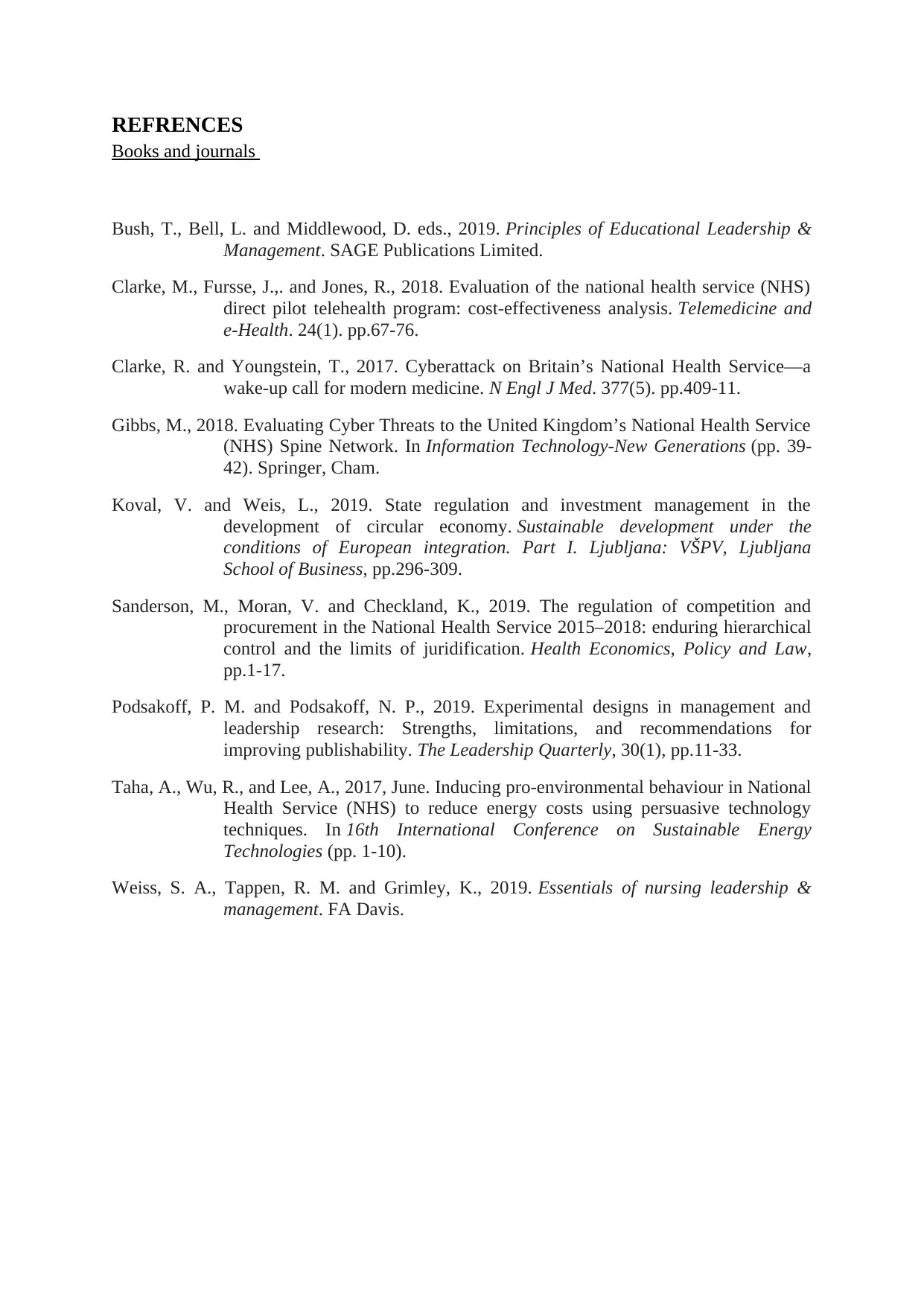
REFRENCES
Books and journals
Bush, T., Bell, L. and Middlewood, D. eds., 2019. Principles of Educational Leadership &
Management. SAGE Publications Limited.
Clarke, M., Fursse, J.,. and Jones, R., 2018. Evaluation of the national health service (NHS)
direct pilot telehealth program: cost-effectiveness analysis. Telemedicine and
e-Health. 24(1). pp.67-76.
Clarke, R. and Youngstein, T., 2017. Cyberattack on Britain’s National Health Service—a
wake-up call for modern medicine. N Engl J Med. 377(5). pp.409-11.
Gibbs, M., 2018. Evaluating Cyber Threats to the United Kingdom’s National Health Service
(NHS) Spine Network. In Information Technology-New Generations (pp. 39-
42). Springer, Cham.
Koval, V. and Weis, L., 2019. State regulation and investment management in the
development of circular economy. Sustainable development under the
conditions of European integration. Part I. Ljubljana: VŠPV, Ljubljana
School of Business, pp.296-309.
Sanderson, M., Moran, V. and Checkland, K., 2019. The regulation of competition and
procurement in the National Health Service 2015–2018: enduring hierarchical
control and the limits of juridification. Health Economics, Policy and Law,
pp.1-17.
Podsakoff, P. M. and Podsakoff, N. P., 2019. Experimental designs in management and
leadership research: Strengths, limitations, and recommendations for
improving publishability. The Leadership Quarterly, 30(1), pp.11-33.
Taha, A., Wu, R., and Lee, A., 2017, June. Inducing pro-environmental behaviour in National
Health Service (NHS) to reduce energy costs using persuasive technology
techniques. In 16th International Conference on Sustainable Energy
Technologies (pp. 1-10).
Weiss, S. A., Tappen, R. M. and Grimley, K., 2019. Essentials of nursing leadership &
management. FA Davis.
Books and journals
Bush, T., Bell, L. and Middlewood, D. eds., 2019. Principles of Educational Leadership &
Management. SAGE Publications Limited.
Clarke, M., Fursse, J.,. and Jones, R., 2018. Evaluation of the national health service (NHS)
direct pilot telehealth program: cost-effectiveness analysis. Telemedicine and
e-Health. 24(1). pp.67-76.
Clarke, R. and Youngstein, T., 2017. Cyberattack on Britain’s National Health Service—a
wake-up call for modern medicine. N Engl J Med. 377(5). pp.409-11.
Gibbs, M., 2018. Evaluating Cyber Threats to the United Kingdom’s National Health Service
(NHS) Spine Network. In Information Technology-New Generations (pp. 39-
42). Springer, Cham.
Koval, V. and Weis, L., 2019. State regulation and investment management in the
development of circular economy. Sustainable development under the
conditions of European integration. Part I. Ljubljana: VŠPV, Ljubljana
School of Business, pp.296-309.
Sanderson, M., Moran, V. and Checkland, K., 2019. The regulation of competition and
procurement in the National Health Service 2015–2018: enduring hierarchical
control and the limits of juridification. Health Economics, Policy and Law,
pp.1-17.
Podsakoff, P. M. and Podsakoff, N. P., 2019. Experimental designs in management and
leadership research: Strengths, limitations, and recommendations for
improving publishability. The Leadership Quarterly, 30(1), pp.11-33.
Taha, A., Wu, R., and Lee, A., 2017, June. Inducing pro-environmental behaviour in National
Health Service (NHS) to reduce energy costs using persuasive technology
techniques. In 16th International Conference on Sustainable Energy
Technologies (pp. 1-10).
Weiss, S. A., Tappen, R. M. and Grimley, K., 2019. Essentials of nursing leadership &
management. FA Davis.
1 out of 8
Related Documents
Your All-in-One AI-Powered Toolkit for Academic Success.
+13062052269
info@desklib.com
Available 24*7 on WhatsApp / Email
![[object Object]](/_next/static/media/star-bottom.7253800d.svg)
Unlock your academic potential
Copyright © 2020–2025 A2Z Services. All Rights Reserved. Developed and managed by ZUCOL.





